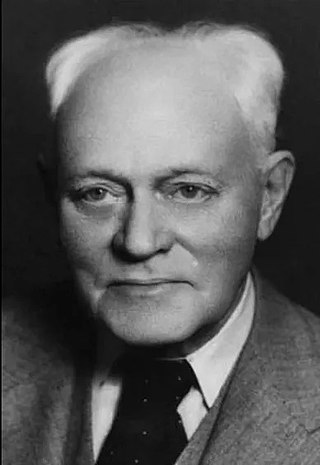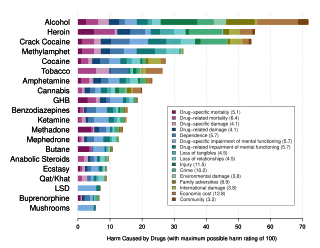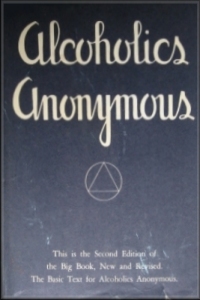
In psychology, codependency is a theory that attempts to explain imbalanced relationships where one person enables another person's self-destructive behavior such as addiction, poor mental health, immaturity, irresponsibility, or under-achievement.

William Duncan Silkworth was an American medical doctor and specialist in the treatment of alcoholism. He was director of the Charles B. Towns Hospital for Drug and Alcohol Addictions in New York City in the 1930s, during which time William Griffith Wilson, a future co-founder of Alcoholics Anonymous (A.A.), was admitted on four occasions for alcoholism. Dr. Silkworth had a profound influence on Wilson and encouraged him to realize that alcoholism was more than just an issue of moral weakness. He introduced Wilson to the idea that alcoholism had a pathological, disease-like basis.

Elizabeth Anne Ford was the first lady of the United States from 1974 to 1977, as the wife of President Gerald Ford. As first lady, she was active in social policy and set a precedent as a politically active presidential spouse. Ford also was the second lady of the United States from 1973 to 1974 when her husband was vice president.

Drug rehabilitation is the process of medical or psychotherapeutic treatment for dependency on psychoactive substances such as alcohol, prescription drugs, and street drugs such as cannabis, cocaine, heroin or amphetamines. The general intent is to enable the patient to confront substance dependence, if present, and stop substance misuse to avoid the psychological, legal, financial, social, and physical consequences that can be caused.Citation needed
The Betty Ford Center (BFC) is a non-profit, residential treatment center for persons with substance dependence in Rancho Mirage, California. It offers inpatient, outpatient, and residential day treatment for alcohol and other drug addictions, as well as prevention and education programs for family and children. The Betty Ford Center, which is adjacent to Eisenhower Medical Center but is under a separate license to practice, has 100 inpatient beds available on their campus and additional lodging for 84 clients in the Residential Day Treatment program. The Betty Ford Center opened on October 4, 1982.

Cocaine Anonymous (CA) is a twelve-step program formed in 1982 for people who seek recovery from drug addiction. It is patterned very closely after Alcoholics Anonymous (AA), although the two groups are unaffiliated. While many CA members have been addicted to cocaine, crack, speed or similar substances, CA accepts all who desire freedom from "cocaine and all other mind-altering substances" as members.

A dysfunctional family is a family in which conflict, misbehavior, and often child neglect or abuse on the part of individual parents occur continuously and regularly. Children that grow up in such families may think such a situation is normal. Dysfunctional families are primarily a result of two adults, one typically overtly abusive and the other codependent, and may also be affected by substance abuse or other forms of addiction, or sometimes by an untreated mental illness. Parents having grown up in a dysfunctional family may over-correct or emulate their own parents. In some cases, the dominant parent will abuse or neglect their children and the other parent will not object, misleading a child to assume blame.
The Hazelden Foundation is an American non-profit organization based in Center City, Minnesota. Hazelden has alcohol and drug treatment facilities in Minnesota, Oregon, Illinois, Florida, Washington, and New York. It offers assessment and primary residential addiction treatment for adults and youth, including extended care and intermediate care, as well as outpatient treatment, aftercare services and a family program. In February 2014, it merged with the Betty Ford Center to form the Hazelden Betty Ford Foundation headquartered in Minnesota.
Dan Anderson was an American clinical psychologist and educator. He served as the president and director of the Hazelden Foundation in Center City, Minnesota. He is most associated with the development of the Minnesota Model, the clinical method of addiction treatment, based in part on the twelve-step program of Alcoholics Anonymous.

Alcoholism in family systems refers to the conditions in families that enable alcoholism and the effects of alcoholic behavior by one or more family members on the rest of the family. Mental health professionals are increasingly considering alcoholism and addiction as diseases that flourish in and are enabled by family systems.
Willingway, located in Statesboro, Georgia, is a privately owned hospital which specializes in treating alcoholism and drug addiction. The treatment modality at Willingway Hospital is based on the principles of the twelve-step program, Alcoholics Anonymous. It is referred to by many as "The Betty Ford Center of the South."

Alcoholics Anonymous: The Story of How More Than One Hundred Men Have Recovered from Alcoholism is a 1939 basic text, describing how to seek recovery from alcoholism. The Big Book was written by William G. "Bill W." Wilson, one of the founders of Alcoholics Anonymous, with the help of various editors. The composition process was not collaborative other than editing. Bill wrote all of the chapters except for "To Employers" which was written by Bill's right hand man, Hank Parkhurst. Parkhurst influenced the more liberal notions of "God as we understand him" and "your own conception of God." Drafts of sections were sent back and forth between Bill W.'s group in New York and Robert Holbrook Smith, the other AA founder, in Akron, Ohio. Dr. Bob made no major changes. It is the predecessor of the seminal "twelve-step method" widely used to treat many addictions, from alcoholism, heroin addiction and marijuana addiction to overeating, sex addiction and gambling addiction, with a strong spiritual and social emphasis. It is one of the best-selling books of all time, having sold 30 million copies. In 2011, Time magazine placed the book on its list of the 100 best and most influential books written in English since 1923, the year in which the magazine was first published. In 2012, the Library of Congress designated it as one of 88 "Books that Shaped America."
Adult Children of Alcoholics founded circa 1973 is a fellowship of people who desire to recover from the effects of growing up in an alcoholic or otherwise dysfunctional family. ACA membership has few formal requirements. ACA does not accept any outside contributions and is supported entirely by donations from its members. The organization is not related to any particular religion and has no political affiliation. Tony A. was among its co-founders and is the author of The Laundry List, 12 steps for adult children of alcoholics, The Problem, which are all published in his book, The Laundry List: The ACOA Experience
William L. White is a writer on addiction recovery and policy.
The Little Red Book is a non-conference approved study guide to The Big Book which was also called The Big Red Book because of the thickness of its pages when it was first published.
Nacoa is a charity in the United Kingdom providing information and support for everyone affected by their parent's drinking through a free, confidential telephone and email helpline. Nacoa is a registered charity in England and Wales – charity number 1009143.
The Hazelden Betty Ford Foundation is an addiction treatment and advocacy organization that was created in 2014 with the merger of the Minnesota-based Hazelden Foundation and the Betty Ford Center in Rancho Mirage, California, in the United States.
John F. Kelly is an American-based researcher and professor of addiction medicine at Harvard Medical School. He is the Founder and Director of the Massachusetts General Hospital Recovery Research Institute, Associate Director of the MGH Center for Addiction Medicine, and Program Director of the MGH Addiction Recovery Management Service.
Ahlan Simsim is an Arabic language co-production of Sesame Street that premiered on 2 February 2020 on MBC 3. The show is the spiritual successor to Iftah Ya Simsim, a Kuwaiti production that ran from 1979 to 1990 and aired in multiple Arabic-speaking countries. The show also shares a name and its characters with an initiative to provide education for displaced Syrian children.






